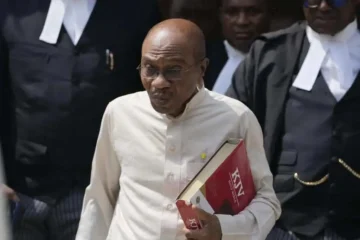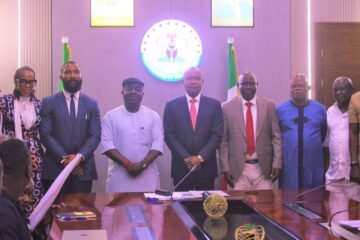By JULIUS OGUNRO
Let us be clear, the reason for the widespread anger is hyperinflation, which has made the prices of goods, especially food, skyrocket. With an unprecedented inflation ratio of 34.19 in June, driven by more than 40 percent food inflation, the country is reeling as people find it difficult to feed themselves.
A bag of Nigerian rice is over N80,000; a bag of brown beans is about N100,000; a bag of garri is N100,000; a crate of eggs is around N5000; a tuber of average-size yam is about N5000; a loaf of normal-size bread is between N1800 and N2500; a bottle of groundnut is over N2000, and that of cashew nuts is around N6500.
The prices of the above items, including those of meat, fish, and other foods, were significantly lower over a year ago. Some prices have doubled, while a few have tripled in just one year. For instance, a 50-kg bag of locally produced rice used to be around N40,000 in 2023, but is now more than twice that. Sadly, in a few weeks, these prices are likely to increase significantly again.
This places an enormous burden on the average citizen. The poverty level in May 2023, when this government came on board and before the dramatic price surge, was 38.9 percent, with an estimated 87 million Nigerians living below the poverty line.
For context, Nigeria had the notorious record of having the second-largest number of poor people after India and nearly 12 percent of the global population who lived in extreme poverty. And that was before President Bola Tinubu. The current data on poverty, vulnerable populations and food insecurity must be terrifying.
The reason for the significant price jump is the macroeconomic policies of the Tinubu administration. The President’s first act on being inaugurated was to declare the removal of petroleum subsidies with that now-(in)famous line, ‘’Subsidy is gone!’’ He has gone ahead to implement other neo-liberal economic policies, which experts have said the country was in dire need of, such as the floating of the naira and the partial removal of subsidies for electricity supply, leading to higher costs for power and fast depreciation of the naira.
In the short term, these fiscal tools have aggravated the country’s economic challenges and caused widespread social discontent, as illustrated by the ongoing protests. It is reasonable to assume that, causing Nigerians to suffer was not the President’s objective.
Going by the book, these policies are expected to increase Nigeria’s economic efficiency; reduce government spending on unproductive areas, open up opportunities for more investments in infrastructure, health, and education; improve our trade balance as a floating currency to help adjust to trade imbalances by depreciating or appreciating, and increase foreign investment as a cheaper naira makes the country more attractive to foreign investors, among other benefits.
But Nigeria is not a textbook case. This will not be the first attempt at economic liberalization, to make the economy more competitive and productive. In the 1980s, the Ibrahim Babangida military regime implemented what could be considered an effort at deregulation and operating a more open and free market system under a World Bank and IMF-supervised Structural Adjustment Programme (SAP). It failed.
The adverse impact of SAP is like an encore of our present challenges. The devaluation of the naira made imports more expensive, fueling inflation. The prices of essential goods increased due to the removal of subsidies, severely affecting the poor. Trade liberalization exposed local industries to unfair competition, causing many to collapse and high unemployment. SAP’s negative impacts on the poor were exacerbated by inadequate social safety nets, increasing the rate of poverty. Some experts believe that Nigeria never truly recovered from the adverse effects of SAP.
Now, we are here and it seems very much like SAP Part Two, but this time with a gorier and more devastating plot. How should the government respond?
The options open to the government fiscally are limited. It could either continue with the ongoing reforms and policies or go back to the pre-Tinubu years when the government was paying unwieldy petroleum subsidies and operated the dual forex exchange system with a significant gap between the official exchange and the black-market rates, which encouraged roundtripping and corruption.
Despite the widespread hardship, the second option is not feasible, practical, or sustainable. petroleum subsidies bill under President Muhammadu Buhari ballooned such that between June 2022 and his last day in office in May 2023, one year later, the administration paid over N3 trillion for subsidies, most of which were likely stolen through government corruption.
Although the Tinubu administration has not come clean over petrol subsidies, which it pays through the backdoor, the subsidy bill must have come down because of the higher price of petroleum today. Returning to the Buhari years of cheaper petrol would mean a significant increase in petroleum subsidies and the corrupt stench that came with it. It is the same with the multiple exchange rates, which gave the former CBN governor, Godwin Emefiele, the latitude to carry out a heist. So, sadly, it is not recommended to acquiesce to the mob and revert to the past era.
But people are hungry. And Angry.
It appears the most important driver of inflation is the depreciation and instability of the naira, even more so than the high cost of petrol and electricity. As an import-dependent country, any adjustment in currency value impacts the cost of importation of goods, which is eventually passed on to end users. This seems to be the case with Nigeria, with the value of the naira crashing to about N1600 to $1. The government must therefore seek ways to stabilize the currency around its fair value. Even if it stabilizes around the current rate, if it remains so for a long time, it would give business people the confidence to plan and make long-term investments, which the country desperately needs. Prices of items would also be stable, even if high, and the economy would adjust accordingly. Right now, the naira is dancing a yoyo, going up and down, giving investors a nightmare.
The federal government should also consider tax breaks for certain businesses; reduce or eliminate tariffs for essential goods (this is already being implemented); reduce the salary of political appointees; cut government waste, and eliminate the pork in our budget, otherwise known as executive or legislative padding.
It should also ramp up its social intervention programmes such as the conditional cash transfer scheme targeting 15 million households. These social programmes are a cesspool of corruption, as evidenced by the charges against the last two ministers who superintend them. Perhaps, if well-managed and the corruption eliminated, they will reach the target beneficiaries and reduce the impact of the fiscal policies.
But expecting the government to get all this right is a near impossibility, considering our historic inefficiency, corruption, and pandering to politics and vested interests. However, if, by magic, the government does it all right and implements its neo-liberal policies to the letter ‘T’, there is still no assurance that these measures will bring the intended gains. Development is a complex process, and one size doesn’t always fit all.
Ogunro is the Director of Research and Strategy at the Future Now Initiative (FNI), an Abuja based civil society group
















